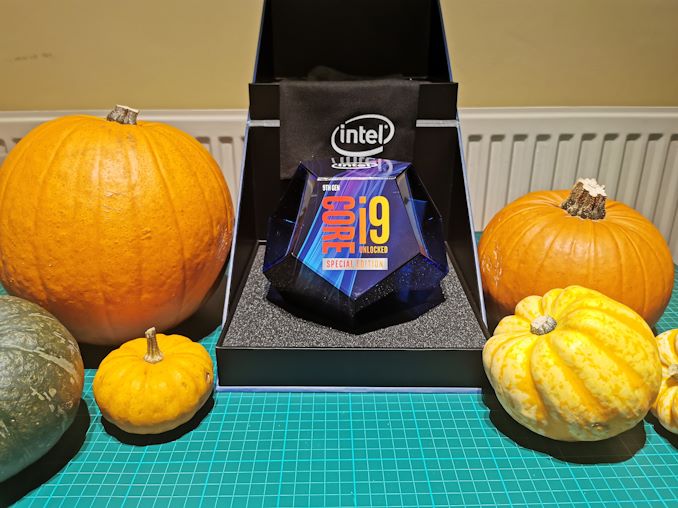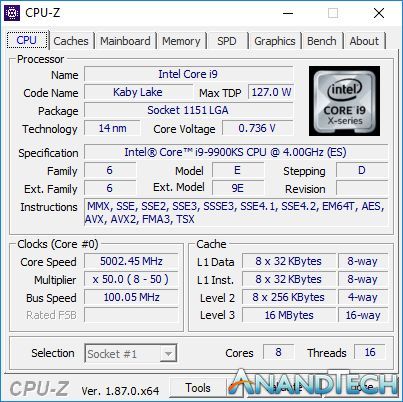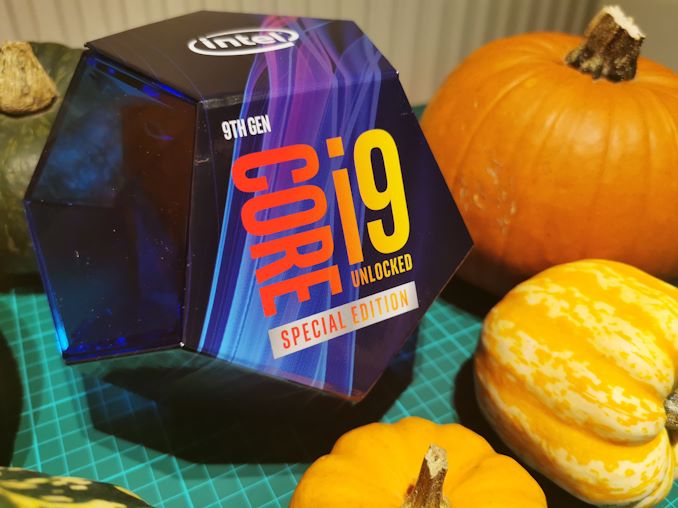The Intel Core i9-9900KS Review: The 5 GHz Consumer Special
by Dr. Ian Cutress on October 31, 2019 10:45 AM EST
Intel likes 5.0 GHz processors. The one area where it claims a clear advantage over AMD is in its ability to drive the frequency of its popular 14nm process. Earlier this week, we reviewed the Core i9-9990XE, which is a rare auction only CPU but with 14 cores at 5.0 GHz, built for the high-end desktop and high frequency trading market. Today we are looking at its smaller sibling, the Core i9-9900KS, built in numbers for the consumer market: eight cores at 5.0 GHz. But you’ll have to be quick, as Intel isn’t keeping this one around forever.
The Battle of the Bits
Every time a new processor comes to market, several questions get asked: how many cores, how fast, how much power? We’ve come through generations of promises of many GHz and many cores for little power, but right now we have an intense battle on our hands. The red team is taking advantage of a paradigm shift in computing with an advanced process node to offer many cores at a high power efficiency as well as at a good frequency. In the other corner is team blue, which has just equipped its arsenal by taking advantage of its most aggressive binning of 14nm yet, with the highest frequency processor for the consumer market, enabled across all eight cores and to hell with the power. Intel’s argument here is fairly simple:
Do you want good all-around, or do you want the one with the fastest raw speed?
The Intel Core i9-9900KS is borne from the battle. In essence it looks like an overclocked Core i9-9900K, however by that logic everything is an overclocked version of something else. In order for Intel to give a piece of silicon off the manufacturing like the name of a Core i9-9900KS rather than a Core i9-9900K requires additional binning and validation, to the extent where it has taken several months from announcement just for Intel to be happy that they have enough chips for demand that will meet the warranty standards.
At the time Intel launched its 9th Generation Core desktop processors, like the Core i9-9900K, I perhaps would not have expected them to launch something like the Core i9-9900KS. It’s a big step up in the binning, and I’d be surprised if Intel gets one chip per wafer that hits this designation. Intel announced the Core i9-9900KS after AMD had launched its Zen 2 Ryzen 3000 family, offering 12 cores with an all core turbo around 4.2 GHz and a +10% IPC advantage over Intel’s Skylake microarchitecture (and derivatives) for a lower price per core. In essence, Intel’s Core i9-9900K consumer flagship processor had a chip that was pretty close to it in performance with several more cores.
Intel is pushing the Core i9-9900KS as the ultimate consumer processor. With eight cores all running at 5.0 GHz, it is promising fast response and clock rates without any slowdown. Intel has many marketing arguments as to why the KS is the best processor on the market, especially when it comes to gaming: having a 5.0 GHz frequency keeps it top of the pile for gaming where frequency matters (low resolution), and many games don’t scale beyond four cores, let alone eight, and so the extra cores on the competition don’t really help here. It will be interesting to see where the 9900KS comes out in standard workload tests however, where cores can matter.
Intel’s 9th Generation Core Processors
The Intel Core i9-9900KS now sits atop of Intel’s consumer product portfolio. The processor is the same 8-core die as the 9900K, unlocked with UHD 620 integrated graphics, but has a turbo of 5.0 GHz. All cores can turbo to 5.0 GHz. The length of the turbo will be motherboard dependent, however.
| Intel 9th Gen Core 8-Core Desktop CPUs | ||||||||
| AnandTech | Cores | Base Freq |
All-Core Turbo | Single Core Turbo Freq |
IGP | DDR4 | TDP | Price (1ku) |
| i9-9900KS | 8 / 16 | 4.0 GHz | 5.0 GHz | 5.0 GHz | UHD 630 | 2666 | 127 W | $513 |
| i9-9900K | 8 / 16 | 3.6 GHz | 4.7 GHz | 5.0 GHz | UHD 630 | 2666 | 95 W | $488 |
| i9-9900KF | 8 / 16 | 3.6 GHz | 4.7 GHz | 5.0 GHz | - | 2666 | 95 W | $488 |
| i7-9700K | 8 / 8 | 3.6 GHz | 4.6 GHz | 4.9 GHz | UHD 630 | 2666 | 95 W | $374 |
| i7-9700KF | 8 / 8 | 3.6 GHz | 4.6 GHz | 4.9 GHz | - | 2666 | 95 W | $374 |
The Core i9-9900KS has an tray price of $513 (when purchased in 1000 unit bulk), which means we’re likely to see an on-shelf price of $529-$549, depending on if it gets packaged in its dodecanal box that our review sample came in.
Compared to the Core i9-9900K or Core i9-9900KF, the Core i9-9900KS extends its 5.0 GHz all through from when 2 cores are active to 8 cores are active. There is still no Turbo Boost Max 3.0 here, which means that all cores are guaranteed to hit this 5.0 GHz number. The TDP is 127 W, which is the maximum power consumption of the processor at its base frequency, 4.0 GHz. Above 4.0 GHz Intel does not state what sort of power to expect. We have this testing further in the review.
Competition
At present, Intel is competing against two major angles with the Core i9-9900KS. On the one side, it already has the Core i9-9900K, which if a user gets a good enough sample, can be overclocked to emulate the 9900KS. Intel does not offer warranty on an overclocked CPU, so there is something to be taken into account – the warranty on the Core i9-9900KS is only a limited 1 year warranty, rather than the standard 3 years it offers to the majority of its other parts, which perhaps indicates the lengths it went to for binning these processors.
From AMD, the current 12-core Ryzen 9 3900X that is already in the market has become a popular processor for users going onto 7nm and PCIe 4.0. It offers more PCIe lanes from the CPU to take advantage of PCIe storage and such, and there are a wealth of motherboards on the market that can take advantage of this processor. It also has an MSRP around the same price, at $499, although is often being sold for much higher due to availability.
AMD also has the 16-core Ryzen 9 3950X coming around the corner, promising slightly more performance than the 3900X, and aside from the $749 MSRP, it’s going to be an unknown on availability until it gets released in November.
| The Competition | ||||||
| Intel i9-9900KS | Intel i9-9900K | Anand Tech |
AMD 2920X |
AMD 3950X |
AMD 3900X |
AMD 3800X |
| 8 | 8 | Cores | 12 | 16 | 12 | 8 |
| 16 | 16 | Threads | 24 | 32 | 24 | 16 |
| 4.0 | 3.6 | Base | 3.5 | 3.5 | 3.8 | 3.9 |
| 8 x 5.0 | 2 x 5.0 | Turbo | 4.3 | 4.7 | 4.6 | 4.5 |
| 2 x 2666 | 2 x 2666 | DDR4 | 4 x 2933 | 2 x 3200 | 2 x 3200 | 2 x 3200 |
| 3.0 x16 | 3.0 x16 | PCIe | 3.0 x64 | 4.0 x24 | 4.0 x24 | 4.0 x24 |
| 127 W | 95 W | TDP | 180 W | 105 W | 105 W | 105 W |
| $513 | $486 | Price | $649 | $749 | $499 | $399 |
It’s worth noting here that while Intel has committed to delivering ‘10nm class’ processors on the desktop in the future, it currently has made zero mention of exactly when this is going to happen. Offering a limited edition all-core 5.0 GHz part like the Core i9-9900KS into the market is a brave thing indeed – it will have to provide something similar or better when it gets around to producing 10nm processors for this market. We saw this once before, when Intel launched Devil’s Canyon: super binned parts that ultimately ended up being faster than those that followed on an optimized process, because the binning aspect ended up being a large factor. Intel either has extreme confidence in its 10nm process for the desktop family, or doesn’t know what to expect.
This Review
In our review, we’re going to cover the usual benchmarking scenarios for a processor like this, as well as examine Intel’s relationship with turbo and how much a motherboard manufacturer can affect the performance.













235 Comments
View All Comments
Spunjji - Friday, November 1, 2019 - link
172W for 8 cores at 5Ghz with the 9900KS142W for 12 cores at ~4.2Ghz for the 3900X.
The X570 chipset TDP is around 15W, 6W for Z390. There's simply no aspect of power efficiency where Intel come out on top here.
Sivar - Friday, November 1, 2019 - link
Please read the first couple of sentences before criticizing.No one is saying the 9900KS is a power efficiency winner. Indeed, when running compute-intense tasks, AMD's larger CPUs are likely the winner most of the time, but you cannot post one set of measurements with one specific configuration and draw broad conclusions. Other measurements differ, and most pit the idle power draw (where most PCs remain most of the time) as lower for Intel. For example,
https://www.guru3d.com/articles-pages/amd-ryzen-7-...
Korguz - Friday, November 1, 2019 - link
thats funny.. cause before zen.. thats what people were saying about amd.. and the power those chips use. now its the opposite, and its ok for intel to use so much power ??? come onvMax65 - Friday, November 1, 2019 - link
Just to add to this...der8aur just tested the 9900KS and it runs games all core 5GHz all the time at between 98w and 126w....Video showing this starts at 3:50..the only time it uses more power is if you are doing high compute loads and or with AVX workloads...but for gaming, it will stay well below...https://www.youtube.com/watch?v=YWSn0cHauJ4
Korguz - Friday, November 1, 2019 - link
well, this review, says other wise. maybe different test setups ??Jorgp2 - Thursday, October 31, 2019 - link
That's because AMDs CPUs were woefully underpowered.Intel is still more efficient in the mobile space
evernessince - Friday, November 1, 2019 - link
Humans find ways to defend their purchases. RTX 2080 Ti owners have 1,200 reasons to defend theirs.AshlayW - Friday, November 1, 2019 - link
If I only I could upvote this post...vMax65 - Friday, November 1, 2019 - link
Surprising that it seems to hurt some that others might want to buy a RTX 2080Ti or a 9900K or a Ferrari for whatever reason. Are we now all to be lambasted for buying anything that maybe costs more?...or heaven forbid they want the best!!! Oh no...run!!! You might as well start on all those that buy better shoes, cookers, microwaves, TV's, bread, cars, chocolates, phones etc, etc ad infinitum or for that matter any branded products period as they cost more than there non branded counter parts...Hold on, we are not going far enough, here's an idea, lets all wear the same clothes, live in the same houses, watch the same TV, eat the same gruel, have only one manufacturere of all products.......so no one can be different and most importantly we certainly do not want any choice, creativity, design et all....Madness......
Midwayman - Thursday, October 31, 2019 - link
I'm mostly reading its a bad time to buy a 9900K since intel will have binned out all the golden samples.